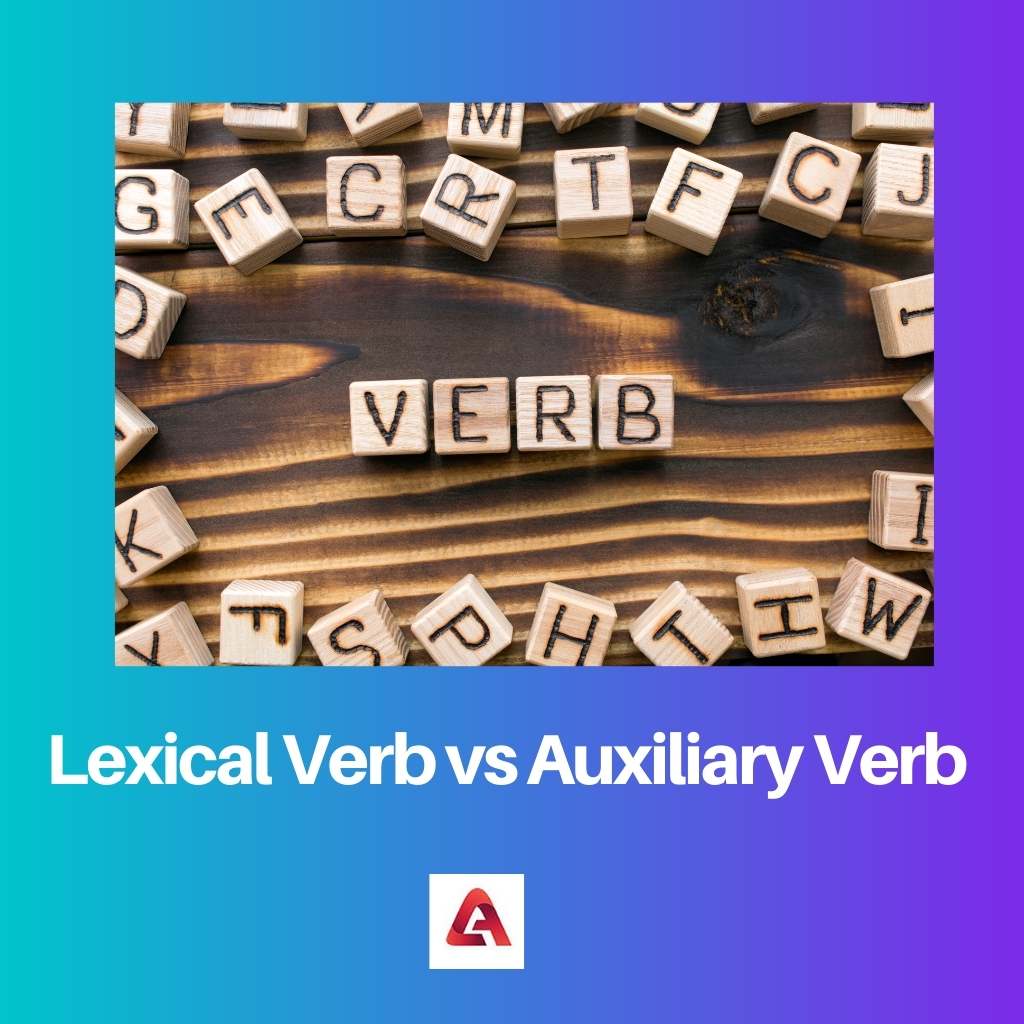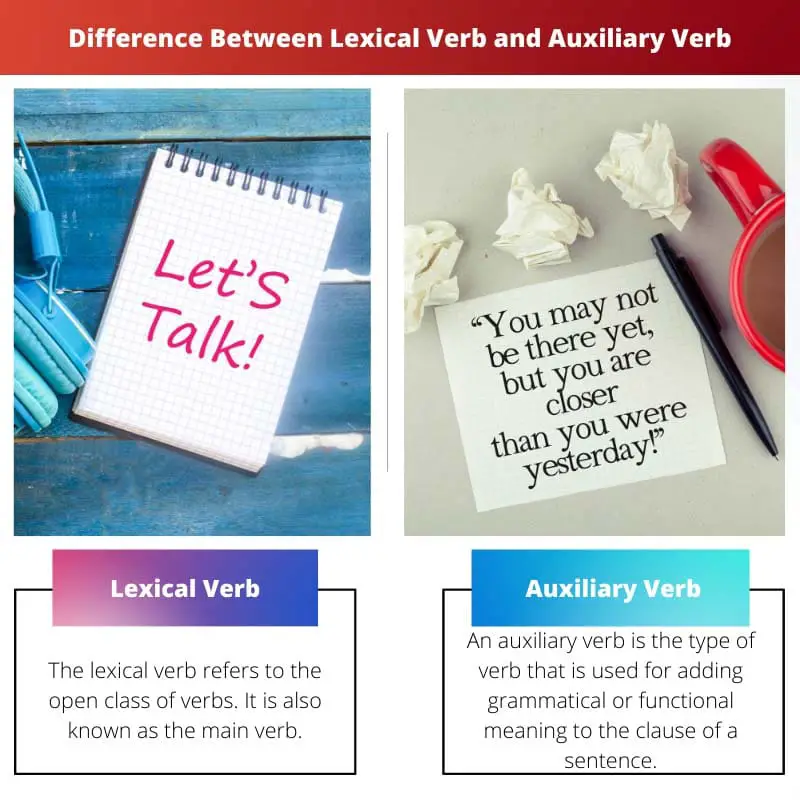Verb plays a pivotal role in the formation of any sentence. It is an action verb that shows the occurrence or happening of something.
A verb can denote a state of being and support a sentence’s sense. The verb can be classified into two major types: lexical verb and auxiliary verb.
Key Takeaways
- Lexical verbs convey a sentence’s main action or state of being, while auxiliary verbs provide grammatical information or help form verb phrases.
- Auxiliary verbs include “be,” “do,” and “have,” and are used to create verb tenses, passive voice, and other grammatical constructions.
- Lexical verbs carry meaning independently, whereas auxiliary verbs depend on other verbs in a sentence to convey meaning.
Lexical Verb vs Auxiliary Verb
A lexical verb, also known as a main verb, conveys the main action or state of being in a sentence, capable of operating independently. An auxiliary verb, or helping verb, supports the main verb, providing additional meaning related to tense, mood, or voice, and cannot stand alone as the main verb.

Lexical verb is used in language as a content word, and it provides distinction from the function word. The lexical verb can be further classified into five major categories that are popular, transitive, intransitive, ditransitive, and ambitransitive.
The lexical verb heads the verb phrase of a sentence.
On the other hand, auxiliary verbs appear with a full verb.
The full verb can carry the primary content that is semantic of the clause. Auxiliary verbs help in expressing the meaning of the infinitive verb. Auxiliary verbs are a part of the closed class of verbs.
Comparison Table
| Parameters of Comparison | Lexical Verb | Auxiliary Verb |
|---|---|---|
| Function | Lexical verb does not help any other verb | Auxiliary verb helps other verbs to express their meaning |
| Class | Lexical verbs are a part of an open class of verbs | Auxiliary verbs are a part of a closed class of verbs |
| Usage type | Can be used alone | Cannot be used alone |
| Example | Laugh, run, sing, ran, play, sit, stand, talk, and others | Have, do or be (is, am, are) |
| Other names | Lexical verb is also known as main verb | Auxiliary verb is also known as helper verb, helping verb or verbal auxiliary |
What is Lexical Verb?
The lexical verb refers to the open class of verbs. It is also known as the main verb. The usage of the lexical verb is to express a state, action, or other related meaning.
The lexical verb heads the verb phrase of a sentence. Lexical verb is used in language as a content word, and it provides distinction from the function word.
The lexical verb can be further classified into five major categories that are copular, transitive, intransitive, ditransitive, and ambitransitive.
Copular lexical verb is used to link the subject to the sentence through a subject complement. Copular verb is also known as a copulative verb. It acts as a linking verb.
In some languages, copular verb also resembles pronouns. A transitive verb can accept more than one object. Intransitive verbs are the ones that do not have any objects.
Ditransitive is referred to as that kind of verb that can accept two objects or a direct object and an indirect object. A ditransitive verb is also known as a bitransitive verb.
An ambitransitive verb is a hybrid of both intransitive and transitive verbs it does not always require a direct object. Examples of me transitive verbs are understood, read or break, and several others.
The lexical verb can also express an action which can be classified as dynamic and static main verbs. The situation or state is expressed through static verbs.
What is Auxiliary Verb?
An auxiliary verb is the type of verb that is used for adding grammatical or functional meaning to the clause of a sentence. It expresses the sentence’s modality, tense, voice, aspect, and emphasis.
A participle or infinitive verb accompanies the auxiliary warm. The function of the auxiliary verb is to cater to the primary semantic content and emphasis of the clause.
An auxiliary verb is also known as a helper verb, helping verb, or verbal auxiliary. Clauses in a sentence can consist of no auxiliary verb or even more than three auxiliary verbs.
An exemplar sentence containing three auxiliary verbs with one participle is dispositive: “The document will have been scrutinized by Henry”. Here the auxiliary verbs are will, have, and be, while the dispositive participle is scrutinized.
Two or more verbs in a sentence can form a verb catena, which signifies a chain of verbs. Such multiple auxiliary verbs are linked together in a hierarchy of structure and form a single syntactic unit.
The auxiliary verb can help in expressing a question or vividly describe the tense or aspect of a sentence. It also helps in expressing a passive voice. The meaning of the auxiliary verb is not consistent across various languages.
Auxiliary verbs appear with a full verb. The full verb can carry the primary content that is semantic of the clause. Auxiliary verbs help in expressing the meaning of the infinitive verb.
Auxiliary verbs are a part of the closed class of verbs. The closed class of verbs refers to fixed verbs that are relatively smaller in number. Auxiliary verbs not only express passive voice but also can vividly express past-time references or perfect aspects.
Main Differences Between Lexical Verb and Auxiliary Verb
- Lexical verb act as an independent clause while auxiliary verb act as a dependent clause.
- Examples of lexical verbs are laugh, run, sing, ran, and other verbs, while an example of auxiliary verbs is have, do, or be (is, am, are).
- Lexical verb can be further classified into five major categories that are copular, transitive, intransitive, ditransitive, and ambitransitive, while auxiliary verb can be further classified into two types – primary auxiliaries and modal auxiliaries.
- Lexical verbs are part of an open class of verbs, while auxiliary verbs are part of a closed class of verbs.
- The function of the lexical verb is to provide an action or state of being informed about the content of any sentence, while the function of the auxiliary verb is to provide grammatical information about any sentence.


I appreciate that the article is comprehensive while focusing on the nuances between lexical and auxiliary verbs.
The distinction between lexical and auxiliary verbs is clearly explained with compelling examples. A helpful reference for linguistics students.
Indeed, the article goes into great detail about the functions and classifications of lexical and auxiliary verbs, which is very beneficial for students and language enthusiasts.
The comparison between lexical and auxiliary verbs is very informative and useful for understanding the differences between them.
I disagree. The article seems to be oversimplifying and generalizing the concepts. It could be more detailed.
I think the article does a great job of breaking down the complex concepts of lexical and auxiliary verbs into easily understandable points.
The article does a great job at giving a clear and detailed explanation of the different types of verbs and their functions.
The article offers a comprehensive explanation of the different types of lexical verbs and their usage in language.
The author’s detailed comparison of lexical and auxiliary verbs is truly enlightening. This was a great read.
I found the description of the auxiliary verb and its role in expressing the modality of a sentence to be particularly insightful.
This article is very informative and clears things up about lexical and auxiliary verbs.
Yes, I really like how it explains the differences and how it’s structured.
It’s precise and easy to understand, great writing.
This is a well-written article, it provides in-depth knowledge about lexical and auxiliary verbs.
The content presented in the article is a great resource for individuals looking to enhance their understanding of verb types and their usage in sentences.
I don’t find this article helpful. It’s too wordy and doesn’t give a clear explanation.
The article is an ideal reference for those interested in understanding lexical and auxiliary verbs in detail.